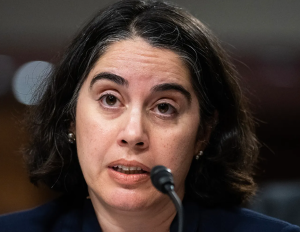During Tuesday’s hearing before the Senate Committee on Armed Services, President Biden’s nominee for the second-highest civilian position in the U.S. Air Force, Melissa Dalton, faced rigorous questioning regarding the Department of Defense’s sale of border wall components and the handling of a Chinese spy balloon, among other concerns impacting national security.

Melissa Dalton, who has been serving as the Pentagon’s Assistant Secretary of Defense for Homeland Defense and Hemispheric Affairs since 2022, is being considered for the role of Under Secretary of the Air Force. Initially nominated by Biden in September for the Air Force’s No. 2 civilian position, Dalton was renominated this month after the Senate failed to act before the end of the year.
Ranking Member Sen. Roger Wicker, R-Miss., expressed reservations in his opening statement, highlighting Dalton’s limited experience with the Air Force. Wicker voiced concerns about the insufficient capacity and capability of the Air Force and Space Force, emphasizing the growing mission sets and heightened vulnerability in the Pacific. He criticized Dalton’s performance in her current role, accusing her of creating division within the military rather than prioritizing readiness and modernization.
Wicker pointed to specific incidents under Dalton’s tenure, including the Department of Defense’s alleged unpreparedness as a Chinese surveillance balloon traversed the continental United States and flew over military sites. He criticized Dalton for evading constitutionally-authorized oversight when Congress sought more information about the incident.
Additionally, Wicker raised concerns about Dalton’s management of the Pentagon’s responsibilities at the southwestern border. He highlighted the Department of Defense’s expenditure of $130,000 daily to store unused border wall construction materials, emphasizing that the panels were ready for use but were being stored instead. Wicker accused the Department of Defense of attempting to auction these panels for pennies on the dollar, bypassing Congressional intent.
Wicker specifically criticized Dalton for not delivering the Homeland Defense Planning Guidance until the end of 2023, more than a year after the release of the National Defense Strategy. He asserted that this track record cast a shadow on her nomination.
Sen. Mike Rounds, R-S.D., joined the questioning, focusing on Dalton’s involvement in the decision-making process related to the Chinese spy balloon that entered U.S. airspace. He sought clarification on whether Dalton was in the direct chain of command regarding the decision not to shoot down the balloon until after it had left American airspace. Dalton admitted to being one of the officials advising Defense Secretary Austin and explained that the decision not to shoot down the balloon over U.S. territory was based on the best military advice from senior U.S. military officials.
